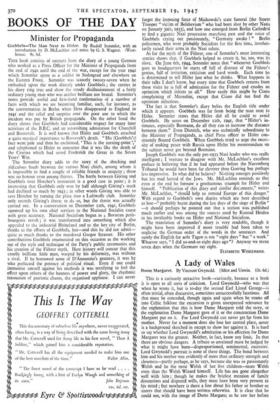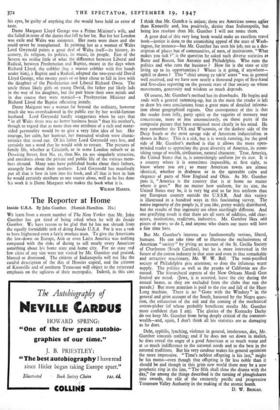A Lady of Wales
Dame Margaret. By Viscount Gwynedd. (Allen and Unwin. 12s. 6d.) This is a curiously attractive book—curiously, because as a book it is open to all sorts of criticism. Lord Gwynedd—who was that when he wrote it, but is to-day the second Earl Lloyd George—is often trivial, often discursive, sometimes unsuccessfully facetious. All that must be conceded, though again and again when he roams off into Celtic folklore the excursion is given unexpected relevance by the explanation that this is how Dame Margaret told the story, or the explanation Dame Margaret gave of it or the construction Dame Margaret put on it. For Lord Gwynedd can never get far from his mother. Never for a moment does she lose her central place, never is a background sketched in except to show her against it. It is hard to say whether Lord Gwynedd's admiration or his affection for Dame Margaret was the greater. Neither, in fact, knew any limit. In that there are obvious dangers. A tribute so unstinted must be judged by what it might have been—disproportioned, sentimental, excessive. Lord Gwynedd's portrait is none of these things. The bond between him and his mother was evidently of more than ordinary strength and closeness—partly perhaps, as he says, because she was so passionately Welsh and he the most Welsh of her five children—more Welsh even than the Welsh Wizard himself. Life has not gone altogether well with him ; though he makes the briefest mention of family dissensions and disputed wills, they must have been very present to his mind ; but nowhere is there a line about his father or brother or sisters that should have been written otherwise. It is clear that he could not, with the image of Dame Margaret as he saw her before his eyes, be guilty of anything that she would have held an error of taste.
Dame Margaret Lloyd George was a Prime Minister's wife, and she failed in none of the duties that fell to her lot. But for her London was exile and Wales was existence. Her roots were there and she could never be transplanted. In painting her as a woman of Wales Lord Gwynedd paints a great deal of Wales itself—its history, its scenery, its religion, its politics, its music, its people. East of the Severn we realise little of what the difference between Liberal and Radical, between Presbyterian and Baptist, meant in the days when Richard Lloyd, the cobbler (but a master cobbler with five hands under him), a Baptist and a Radical, adopted the two-year-old David Lloyd George, who twenty years or so later chose to fall in love with the daughter of the Presbyterian and Liberal Richard Owen. The uncle thrust likely girls on young David, the father put likely lads in the way of his daughter, but the pair knew their own minds and in due course they were married—a Presbyterian Minister and Richard Lloyd the Baptist officiating jointly.
Dame Margaret was a woman far beyond the ordinary, however much she was overshadowed in the public eye by her world-famous husband. Lord Gwynedd hardly exaggerates when he says that "in all Wales there was no better business brain" than his mother's, though to regard that as more than one attribute of a rich and many- sided personality would be to give a very false idea of her. Her courage, her calm, her humour, her measured wisdom were charac- teristics that stood out. Of his father Lord Gwynedd says less, and certainly not a word that he would wish to retract. The pictures of family life, whether at Criccieth, or in some London suburb or in Downing Street, first No. II, then No. to, are singularly attractive, and anecdotes about the private and public life of the various mem- bers abound. Many sons have published books about their fathers, strangely few about their mothers. Lord Gwynedd has manifestly put all that is best in him into his book, and all that is best in him he would certainly attribute to one source alone, well as he has done his work it is Dame Margaret who makes the book what it is.
WILSON HARRIS.



































 Previous page
Previous page